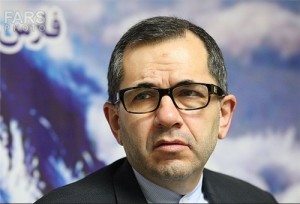 An Iranian official has urged cooperation between Iran and the EU to fight the rise of extremism in Syria, which �constitutes a threat to the entire world.�
An Iranian official has urged cooperation between Iran and the EU to fight the rise of extremism in Syria, which �constitutes a threat to the entire world.�Iranian Deputy Foreign Minister for European and American Affairs Majid Takht-e-Ravanchi on Monday referred to the increasing involvement of extremist groups in the foreign-sponsored militancy in Syria and described it as a common concern for Iran and the EU, which also threatens the Middle East and other regions in the world.
The Iranian official made the remarks in a meeting with a visiting European Parliament (EP) delegation headed by Finish diplomat, Tarja Cronberg in Tehran.
Syria has been gripped by a deadly crisis since 2011. Reportedly, thousands of militants from over 80 countries including Saudi Arabia, Tunisia, Kuwait, Chechnya, the US and Europe are fighting in Syria.
British Foreign Secretary William Hague on December 7 warned against the threat posed by militant extremists fighting against the Syrian government to Europe.
Earlier in December, The Telegraph reported that Britons make up the largest contingent of militants from Western countries fighting against the government of President Assad. From among the 1,300 Westerners fighting with different militant groups in Syria, over 300 are British nationals.
According to reports, the Western powers and their regional allies - especially Qatar, Saudi Arabia, and Turkey - are supporting the militants operating inside Syria.
Takht-e-Ravanchi stressed diplomacy as the real solution to the ongoing crisis in Syria, expressing Iran�s readiness to play a constructive and positive role with regards to the issue.
Also referring to the nuclear negotiations between Iran and six world powers - Britain, China, France, Russia and the US plus Germany, the Iranian deputy foreign minister said that the Islamic Republic is determined to resolve the decade-long impasse over its nuclear energy program.
Cronberg, for her part, expressed the European Parliament and the EU�s support for the nuclear negotiations and the recent agreement recently reached between Iran and the other six countries in Geneva.
Iran and the sextet on November 24 sealed an interim deal aimed at paving the way for the full resolution of the dispute over the Islamic Republic�s nuclear energy program.
Under the Geneva deal, the six countries have undertaken to provide Iran with some sanctions relief in exchange for Iran agreeing to limit certain aspects of its nuclear activities during six months.
By Press TV
The Iran Project is not responsible for the content of quoted articles.










